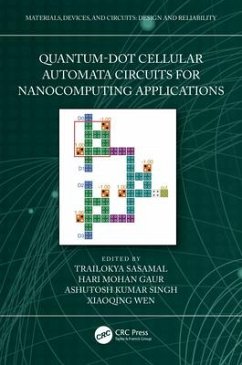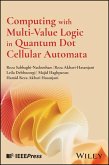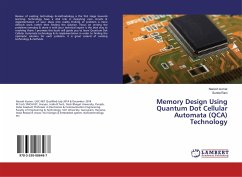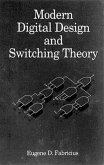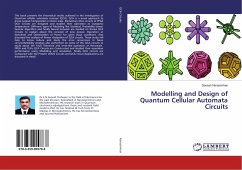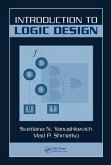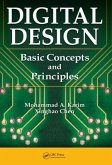Quantum-Dot Cellular Automata Circuits for Nanocomputing Applications
Herausgeber: Sasamal, Trailokya; Wen, Xiaoqing; Singh, Ashutosh Kumar; Gaur, Hari Mohan
Quantum-Dot Cellular Automata Circuits for Nanocomputing Applications
Herausgeber: Sasamal, Trailokya; Wen, Xiaoqing; Singh, Ashutosh Kumar; Gaur, Hari Mohan
- Gebundenes Buch
- Merkliste
- Auf die Merkliste
- Bewerten Bewerten
- Teilen
- Produkt teilen
- Produkterinnerung
- Produkterinnerung
This book provides a composite solution for optimal logic designs for quantum-dot cellular automata based circuits. It includes the basics of new logic functions and novel digital circuit designs, quantum computing with QCA, new trends in quantum and quantum-inspired algorithms and applications, and algorithms to support QCA designers.
Andere Kunden interessierten sich auch für
![Computing with Multi-Value Logic in Quantum Dot Cellular Automata Computing with Multi-Value Logic in Quantum Dot Cellular Automata]() Reza Sabbaghi-NadooshanComputing with Multi-Value Logic in Quantum Dot Cellular Automata142,99 €
Reza Sabbaghi-NadooshanComputing with Multi-Value Logic in Quantum Dot Cellular Automata142,99 €![Memory Design Using Quantum Dot Cellular Automata (QCA) Technology Memory Design Using Quantum Dot Cellular Automata (QCA) Technology]() Naresh KumarMemory Design Using Quantum Dot Cellular Automata (QCA) Technology25,99 €
Naresh KumarMemory Design Using Quantum Dot Cellular Automata (QCA) Technology25,99 €![Modern Digital Design and Switching Theory Modern Digital Design and Switching Theory]() Eugene D FabriciusModern Digital Design and Switching Theory163,99 €
Eugene D FabriciusModern Digital Design and Switching Theory163,99 €![Modelling and Design of Quantum Cellular Automata Circuits Modelling and Design of Quantum Cellular Automata Circuits]() Ganesh NarasimhanModelling and Design of Quantum Cellular Automata Circuits51,99 €
Ganesh NarasimhanModelling and Design of Quantum Cellular Automata Circuits51,99 €![Antennas for Industrial and Medical Applications with Optimization Techniques for Wireless Communication Antennas for Industrial and Medical Applications with Optimization Techniques for Wireless Communication]() Antennas for Industrial and Medical Applications with Optimization Techniques for Wireless Communication126,99 €
Antennas for Industrial and Medical Applications with Optimization Techniques for Wireless Communication126,99 €![Introduction to Logic Design Introduction to Logic Design]() Svetlana N YanushkevichIntroduction to Logic Design240,99 €
Svetlana N YanushkevichIntroduction to Logic Design240,99 €![Digital Design Digital Design]() Mohammad A KarimDigital Design187,99 €
Mohammad A KarimDigital Design187,99 €-
-
-
This book provides a composite solution for optimal logic designs for quantum-dot cellular automata based circuits. It includes the basics of new logic functions and novel digital circuit designs, quantum computing with QCA, new trends in quantum and quantum-inspired algorithms and applications, and algorithms to support QCA designers.
Hinweis: Dieser Artikel kann nur an eine deutsche Lieferadresse ausgeliefert werden.
Hinweis: Dieser Artikel kann nur an eine deutsche Lieferadresse ausgeliefert werden.
Produktdetails
- Produktdetails
- Verlag: CRC Press
- Seitenzahl: 240
- Erscheinungstermin: 31. Juli 2023
- Englisch
- Abmessung: 234mm x 156mm x 16mm
- Gewicht: 531g
- ISBN-13: 9781032420189
- ISBN-10: 1032420189
- Artikelnr.: 67824835
- Herstellerkennzeichnung
- Libri GmbH
- Europaallee 1
- 36244 Bad Hersfeld
- gpsr@libri.de
- Verlag: CRC Press
- Seitenzahl: 240
- Erscheinungstermin: 31. Juli 2023
- Englisch
- Abmessung: 234mm x 156mm x 16mm
- Gewicht: 531g
- ISBN-13: 9781032420189
- ISBN-10: 1032420189
- Artikelnr.: 67824835
- Herstellerkennzeichnung
- Libri GmbH
- Europaallee 1
- 36244 Bad Hersfeld
- gpsr@libri.de
Dr. Trailokya Nath Sasamal is currently working as Assistant Professor in the Department of Electronics & Communication Engineering at National Institute of Technology, Kurukshetra, India since August 2013. He has more than 11 years research and teaching experience in various University systems of India. Dr. Sasamal has obtained Ph.D. degree from the Department of Electronics & Communication Engineering, NIT Kurukshetra, Haryana. He obtained his M. Tech degree in Electronics Engineering from Indian Institute of Technology, Banaras Hindu University, Varanasi, India. He obtained his B. Tech degree in Electronics & Telecommunication from the KEC, Bhubaneswar, India, in 2007. He has presented and published over 60 research papers in reputed journals and various national and international conferences. His research interests include Quantum-dot Cellular Automata, Reversible logic, and new architectures for emerging nano-devices. He is the author of the book "Quantum-Dot Cellular Automata Based Digital Logic Circuits: A Design Perspective", published in Springer. He is also involved in reviewing processes in different journals and conferences such as; IEEE, IET, JCSC, IETE, DSJ etc. Dr. Hari Mohan Gaur is currently working with the School of Computer Science Engineering and Technology at Bennett University, Greater Noida, India. He obtained Ph.D from National Institute of Technology Kurukshetra (NIT-KKR) in Reversible and Quantum Computation. Hari Mohan Gaur has more than 15 years of experience in academic, research and administrative capacities. He is a distinguished Researcher, well known in Academic Fraternity for his interdisciplinary research in the areas of Quantum Computation, Fault Tolerant Digital Design, IOT and Data Security in Cloud Environment. Dr. Gaur holds the credit of contribution in several quality research journals of international repute published by IEEE, ACM, IET, Elsevier, etc. He is having a wide exposure of handling research proposals, international conferences, Training and Faculty Development Programs. He is involved in a joint research group involving eminent professors from top universities of US, UK, Japan, Taiwan and Malaysia. He has also been editor and reviewer of several international journals and is a member of IEEE since 2017. Prof. Ashutosh Kumar Singh is an esteemed researcher and academician in the domain of Electrical and Computer engineering. Currently, he is working as a Professor; Department of Computer Applications; National Institute of Technology; Kurukshetra, India. He has more than 20 years research, teaching and administrative experience in various University systems of the India, UK, Australia and Malaysia. Dr. Singh obtained his Ph. D. degree in Electronics Engineering from Indian Institute of Technology-BHU, India; Post Doc from Department of Computer Science, University of Bristol, United Kingdom and Charted Engineer from United Kingdom. He is the recipient of Japan Society for the Promotion of Science (JSPS) fellowship for visit in University of Tokyo and other universities of Japan. His research area includes Verification, Synthesis, Design and Testing of Digital Circuits, Predictive Data Analytics, Data Security in Cloud, Web Technology. He has more than 350 publications till now which includes peer reviewed journals, books, conferences, book chapters and news magazines in these areas. He has co-authored eight books including "Web Spam Detection Application using Neural Network", "Digital Systems Fundamentals" and "Computer System Organization & Architecture". Prof. Singh has worked as principal investigator/investigator for six sponsored research projects and was a key member on a project from EPSRC (United Kingdom) entitled "Logic Verification and Synthesis in New Framework". Dr. Singh has visited several countries including Australia, United Kingdom, South Korea, China, Thailand, Indonesia, Japan and USA for collaborative research work, invited talks and to present his research work. He had been entitled for 15 awards such as Merit Awards-2003 (Institute of Engineers), Best Poster Presenter-99 in 86th Indian Science Congress held in Chennai, INDIA, Best Paper Presenter of NSC'99 INDIA and Bintulu Development Authority Best Postgraduate Research Paper Award for 2010, 2011, 2012. Prof. Xiaoqing Wen (Fellow, IEEE) received the B.E. degree from Tsinghua University, China, in 1986, the M.E. degree from Hiroshima University, Japan, in 1990, and the Ph.D. degree from Osaka University, Japan, in 1993. From 1993 to 1997, he was an Assistant Professor at Akita University, Japan. He was a Visiting Researcher at the University of Wisconsin, Madison, USA, from October 1995 to March 1996. He joined SynTest Technologies, Inc., USA, in 1998, and served as its Chief Technology Officer until 2003. In 2004, he joined the Kyushu Institute of Technology, Japan, where he is currently a Professor and the Chair of the Department of Creative Informatics. He founded the Dependable Integrated Systems Research Center in 2015 and served as its Director until 2017. He has co-authored and co-edited two books: VLSI Test Principles and Architectures: Design for Testability (Morgan Kaufmann, 2006) and Power-Aware Testing and Test Strategies for Low Power Devices (Springer, 2009). He holds 43 U.S. patents and 14 Japanese patents on VLSI testing. His research interests include VLSI test, diagnosis, and testable design. He is a member of the IEICE, the IPSJ, and the REAJ. He received the 2008 IEICE-ISS Best Paper Award for his pioneering work on X-filling-based low-capture-power test generation. He has/is served/serving as an Associate Editor for the IEEE Transactions on Computer- Aided Design, the IEEE Transactions on Very Large Scale Integration (VLSI) Systems, and the Journal of Electronic Testing: Theory and Applications
Chapter 1. Towards The Evaluation from Low Power VLSI to Quantum Circuits.
Chapter 2. Investigations on Designing of Adders, Multiplexers and
Flip-Flops for Fast Memories Development in QCA Technology. Chapter 3. An
optimized approach of Designing Adders and Multiplexer in QCA.Chapter 4.
High-Speed Comparator and Parity Generator towards simplified clocking
circuit in QCA Technology. Chapter 5. Towards Effective Multiplexer Circuit
Design in QCA Technology. Chapter 6. An optimized approach of Designing
Register and Counter in QCA. Chapter 7. QCA-based Designs of Majority
Gates, Flip-Flops and Polar Encoders. Chapter 8. Physically realizable
Reversible logic gates in beyond CMOS QCA Technology. Chapter 9. Design of
new circuits for Reversible ALU in QCA Technology. Chapter 10. Stick
Diagram Representation for MQCA-based Multiplexer. Chapter 11. Fully
Depleted Planar bi-layer Junctionless Transistor for Future Technology
Node. Index.
Chapter 2. Investigations on Designing of Adders, Multiplexers and
Flip-Flops for Fast Memories Development in QCA Technology. Chapter 3. An
optimized approach of Designing Adders and Multiplexer in QCA.Chapter 4.
High-Speed Comparator and Parity Generator towards simplified clocking
circuit in QCA Technology. Chapter 5. Towards Effective Multiplexer Circuit
Design in QCA Technology. Chapter 6. An optimized approach of Designing
Register and Counter in QCA. Chapter 7. QCA-based Designs of Majority
Gates, Flip-Flops and Polar Encoders. Chapter 8. Physically realizable
Reversible logic gates in beyond CMOS QCA Technology. Chapter 9. Design of
new circuits for Reversible ALU in QCA Technology. Chapter 10. Stick
Diagram Representation for MQCA-based Multiplexer. Chapter 11. Fully
Depleted Planar bi-layer Junctionless Transistor for Future Technology
Node. Index.
Chapter 1. Towards The Evaluation from Low Power VLSI to Quantum Circuits.
Chapter 2. Investigations on Designing of Adders, Multiplexers and
Flip-Flops for Fast Memories Development in QCA Technology. Chapter 3. An
optimized approach of Designing Adders and Multiplexer in QCA.Chapter 4.
High-Speed Comparator and Parity Generator towards simplified clocking
circuit in QCA Technology. Chapter 5. Towards Effective Multiplexer Circuit
Design in QCA Technology. Chapter 6. An optimized approach of Designing
Register and Counter in QCA. Chapter 7. QCA-based Designs of Majority
Gates, Flip-Flops and Polar Encoders. Chapter 8. Physically realizable
Reversible logic gates in beyond CMOS QCA Technology. Chapter 9. Design of
new circuits for Reversible ALU in QCA Technology. Chapter 10. Stick
Diagram Representation for MQCA-based Multiplexer. Chapter 11. Fully
Depleted Planar bi-layer Junctionless Transistor for Future Technology
Node. Index.
Chapter 2. Investigations on Designing of Adders, Multiplexers and
Flip-Flops for Fast Memories Development in QCA Technology. Chapter 3. An
optimized approach of Designing Adders and Multiplexer in QCA.Chapter 4.
High-Speed Comparator and Parity Generator towards simplified clocking
circuit in QCA Technology. Chapter 5. Towards Effective Multiplexer Circuit
Design in QCA Technology. Chapter 6. An optimized approach of Designing
Register and Counter in QCA. Chapter 7. QCA-based Designs of Majority
Gates, Flip-Flops and Polar Encoders. Chapter 8. Physically realizable
Reversible logic gates in beyond CMOS QCA Technology. Chapter 9. Design of
new circuits for Reversible ALU in QCA Technology. Chapter 10. Stick
Diagram Representation for MQCA-based Multiplexer. Chapter 11. Fully
Depleted Planar bi-layer Junctionless Transistor for Future Technology
Node. Index.

